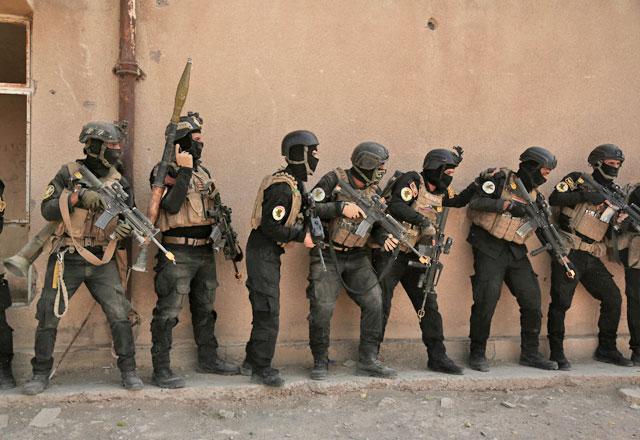You are here
Iraq's parliament adopts law legalising Shiite militias
By AP - Nov 26,2016 - Last updated at Nov 26,2016
BAGHDAD — Iraq's parliament on Saturday voted to accord full legal status to government-sanctioned Shiite militias as a "back-up and reserve" force for the military and police and empower them to "deter" security and terror threats facing the country, like the Daesh terror group.
The legislation, supported by 208 of the chamber's 327 members, was promptly rejected by Sunni Arab politicians and lawmakers who said it was evidence of what they called the "dictatorship" of the country's Shiite majority.
"The majority does not have the right to determine the fate of everyone else," Osama Al Nujaifi, one of Iraq's three vice presidents and a senior Sunni politician, told a news conference after the vote. "There should be genuine political inclusion. This law must be revised."
Sunni lawmaker Ahmed Al Masary said the legislation fuels doubts about the participation of all Iraqi communities in the political process. "The legislation aborts nation building," he said, adding that the law created a dangerous parallel to the country's military and police and that the Shiite bloc in parliament has not provided the Sunnis with the assurances they required.
Many in the Sunni Arab community wanted the militiamen to be integrated into the country's military and police, a proposition long rejected by Shiite militia leaders, some of whom have on occasion spoken about their armed groups evolving into a force akin to Iran's Revolutionary Guards or Lebanon's Iranian-backed Hizbollah
The law, tabled by the chamber's largest Shiite bloc, placed the militias under the command of Shiite Prime Minister Haider Al Abadi and gave militiamen salaries and pensions that mirror those of the military and the police.
Senior Shiite politician Amar Al Hakim sought to reassure the Sunni lawmakers, saying a host of laws to be issued by the prime minister to regulate the work of the militias would allay their fears.
"The law creates a suitable climate for national unity," he said.
In a statement, Abadi welcomed the legislation and said the "Popular Mobilisation" forces, the formal name of the militias, would cover all Iraqi sects, a thinly veiled reference to the much smaller and weaker Sunni tribal forces along with armed groups from smaller minorities.
"We must show gratitude for the sacrifices offered by those heroic fighters, young and elderly. It is the least we can offer them," said the statement.
"The Popular Mobilisation will represent and defend all Iraqis wherever they are."
The Shiite militias alone number more than 100,000 fighters.
The vote comes at a sensitive time when the government is waging a major campaign to dislodge Daesh from Mosul, Iraq's second largest city and the last major urban center still held by the extremist group. The government, through the military, has been trying to use the campaign to reassure the city's mostly Sunni residents, promising them a life free of the atrocities and excesses of the extremist Daesh.
The Shiite militias, most of which are backed by neighboring Shiite Iran, have been bankrolled and equipped by the government since shortly after Daesh swept across much of northern and western Iraq in 2014. Many of these groups existed long before Daesh emerged, fighting American troops in major street battles during the US military presence in Iraq between 2003 and 2011.
They have played a key role in checking the advance of Daesh on Baghdad and the Shiite Shrine cities of Samarra and Karbala in the summer of 2014 and later helped liberate Daesh-held areas to the south, northeast and north of Baghdad, replacing the security forces that collapsed in the face of the Daesh blitz in 2014. However, their role has somewhat diminished as more and more of Iraq's security forces have regained their strength.
Iraq's Sunni Arabs and rights groups have long complained that the militiamen have been involved in extrajudicial killings, abuse and the theft or destruction of property in Sunni areas from which they drove out Daesh. The militias' commanders, however, deny the charges or insist that the excesses are the work of an isolated few.
Currently, the militias are tasked with driving Daesh from the town of Tal Afar west of Mosul. They seized the town's airstrip earlier last week. Abadi met militia commanders at the strip on Thursday and later lavishly praised their role in the fight against Daesh. The militias have been excluded from the battle for Mosul at the request of Sunni politicians, out of fear they would abuse the city's Sunnis.
Related Articles
Iraq's prime minister called on Sunni tribal fighters to abandon Daesh terror group Sunday, ahead of a promised offensive to retake president Saddam Hussein's hometown from the extremists.
BAGHDAD — An unlikely array of forces is converging on the city of Mosul, lining up for a battle on the historic plains of northern Iraq tha
BAGHDAD — As fighting in Iraq raged last summer, Iranian Major-General Qassem Soleimani came across unexpected opposition to his plans

















